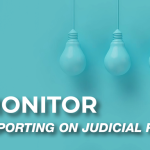
N3.T5 – SPECIAL DEPARTMENT OF THE HIGH COURT IN PODGORICA TO GAIN NEW STAFF AMID ONGOING DEPARTURES
12/01/2025
N3.T7 – ANALYSIS OF THE WORK OF THE PROSECUTORIAL COUNCIL IN 2023 AND 2024
12/01/2025N3.T6 – ANALYSIS OF THE WORK OF THE JUDICIAL COUNCIL IN 2023 AND 2024

HRA NEWSLETTER 3 – TOPIC 6
The Human Rights Action’s report titled “Analysis of the Procedures for the Election, Advancement, and Determination of Responsibility of Judges in Montenegro in 2023 and 2024” highlights a troubling situation within the Montenegrin judiciary, primarily stemming from an insufficient number of judges. Nonetheless, the report also acknowledges some positive developments within the Judicial Council.
“We finally have a modern Judicial Council with an updated website, which conducts interviews and elects judges without scandals”, stated HRA director Tea Gorjanc-Prelević. However, she emphasized the need for the Judicial Council to meet the European Commission’s expectations quickly, particularly in light of Montenegro’s aspirations for European Union membership. “It is essential to establish a transparent, efficient, independent, and responsible judiciary that is resistant to political and other inappropriate influences.”
The HRA analysis indicates that from the beginning of 2023 until November 2024, the offices of 51 judges were terminated. In that same timeframe, 50 candidates for judges were selected and sent for training. Upon completion of their training, 46 candidates were elected as judges, 16 judges were promoted to higher courts, and 12 individuals were appointed as court presidents.
However, the analysis also noted shortcomings in the Judicial Council’s timeliness in implementing procedures for selecting judge candidates, taking an average of six months to send candidates for training after announcing a competition. Moreover, it reportedly took an additional four months for candidates to be elected as judges once they finished training. “Given the chronic shortage of judges in the Montenegrin judiciary, this lack of timeliness has significant consequences”, the HRA document stated. To address this issue, it recommended more frequent temporary assignments of judges to courts burdened by a backlog, accompanied by new incentive measures to motivate judges.
During the presentation of the analysis results, President of the Judicial Council Radoje Korać emphasized the challenges associated with filling judicial positions, noting a decline in interest compared to previous years.
“We do not have a base from which we can simply elect judges… We often find ourselves in a situation where we can only elect those who applied and met the minimum qualifications. Sometimes, we even have fewer candidates than the number of advertised positions”, Korać explained. To prevent a paralysis of the courts, he proposed the introduction of substitute judges.
“These judges would be similar to others, except their obligation would be to be assigned by the decision of the Judicial Council to courts where judges have been absent for a certain period”, explained Korać. He added that if such a judge rotates between courts over 15 or 20 years, they would eventually have the right to choose to remain as a permanent judge in a specific court.
Valentina Pavličić, the newly elected President of the Supreme Court, acknowledged that the Montenegrin judicial system tends to fall behind in handling cases, emphasizing, “We will address backlogs proactively; we will not let them accumulate or defer them for later. In this regard, I expect logistical support from the other two branches of power. I anticipate that each will provide whatever is necessary within their scope of competencies to ensure the Montenegrin judiciary can adjudicate in a timely manner”. She also underscored the importance of resisting any form of pressure.
The HRA analysis highlighted numerous examples of pressures faced by judges, many of which were politically motivated. Furthermore, there have been reports of verbal attacks and threats against judges, which jeopardize the integrity and independence of the judiciary. “Arbitrary political attacks by high-level state officials on the judicial branch are particularly concerning. The Judicial Council has reacted several times in such situations, although some failures to respond or delayed responses have also been noted”, the analysis stated.
Additionally, the report assessed that not all decisions made by the Judicial Council regarding judges’ promotions were adequately explained, and a similar lack of transparency was noted during the election of court presidents.
Another issue raised in the HRA analysis pertains to the functioning of the Commission for the Code of Ethics of Judges. The commission’s work was stalled for 20 months due to a lack of quorum, and it only began addressing cases from 2022 and 2023 at the end of March 2024. Since its reactivation, 21 cases have been concluded, with opinions regarding violations of the Code of Ethics provided in only two. The HRA argues that the Commission should strive to determine the factual situation more objectively, rather than relying solely on complaints and the statements made by the judges facing those complaints.
The analysis revealed that from the beginning of 2023 until November 1, 2024, only ten disciplinary procedures were initiated against judges, with responsibility being established in just one case (which remained non-final as of December 2024). Three disciplinary proceedings, initiated in 2020 and 2021, were suspended due to the judges’ resignations. Of the five procedures launched for the same disciplinary offense—failure to provide data on assets and income—none established responsibility for the judges, despite the Agency for the Prevention of Corruption having previously determined that all involved had violated the Law on Prevention of Corruption by not submitting accurate and complete information regarding their own assets and those of their spouses. Furthermore, the disciplinary prosecutor and the Disciplinary Panel of the Judicial Council maintain the position that a single failure to provide asset and income data does not qualify as a disciplinary offense, arguing that it only constitutes a violation if it is a continuous failure. The HRA analysis criticized this interpretation, stating that it undermines the principle of accountability regarding asset and income reporting, effectively allowing for impunity in serious violations, as long as the omission occurs only once.
It was also highlighted that complaints are not proving to be an effective mechanism for determining judges’ accountability for unlawful conduct. In two cases where complaints were deemed well-founded, they did not lead to any established responsibility because the judge resigned, resulting in the suspension of the proceedings.
The report pointed out the ambiguity surrounding which body—the Complaints Commission or the Judicial Council—should make decisions on complaints, suggesting that the distribution of competencies needs clarification.
Additionally, the HRA called for expedited processing of complaints submitted by citizens to the Judicial Council, noting that the current timeline averages four to six months. They recommended that disciplinary procedures be completed within a maximum of one year, rather than the current duration of two to three years, which could lead to cases falling under the statute of limitations or judges meeting the requirements for retirement before action is taken.
HRA NEWSLETTER 3
- N3.T1 – UNCONSTITUTIONAL OPERATION OF THE CONSTITUTIONAL COURT
- N3.T2 – 29 JUDGES AND 11 STATE PROSECUTORS STEP DOWN OVER TWO YEARS
- N3.T3 – JUDGE DANILO JEGDIĆ SENTENCED TO HOUSE ARREST; SOME CHARGES DISMISSED DUE TO STATUTE OF LIMITATIONS FROM TRIAL DELAYS
- N3.T4 – MEDENICAS’ TRIAL TO RESTART 22 MONTHS AFTER INDICTMENT
- N3.T5 – SPECIAL DEPARTMENT OF THE HIGH COURT IN PODGORICA TO GAIN NEW STAFF AMID ONGOING DEPARTURES
- N3.T6 – ANALYSIS OF THE WORK OF THE JUDICIAL COUNCIL IN 2023 AND 2024
- N3.T7 – ANALYSIS OF THE WORK OF THE PROSECUTORIAL COUNCIL IN 2023 AND 2024
- N3.T8 – DIZDAREVIĆ ONLY CANDIDATE FOR JUDICIAL COUNCIL; PROSECUTORIAL COUNCIL COMPLETION STILL PENDING
- N3.T9 – WARNINGS FROM STRASBOURG COURT CONCERNING LACK OF PROMPTNESS
- N1.T10 – SPECIAL STATE PROSECUTOR FACES SEVEN-MONTH SENTENCE FOR ABUSE OF OFFICE IN LATEST CONVICTION
- N3.T11 – BASIC COURT IN BAR JUDGES BURDENED WITH AN AVERAGE OF 941 CASES
- N3.T12 – PROPOSAL TO AMEND THE CRIMINAL PROCEDURE CODE REGARDING EXTENSION OF DETENTION WITHDRAWN
- N3.T13 – CONFRONTATION OF JUDGES IN HIGH COURT IN PODGORICA OVER DISPUTED VERDICT
- N3.BN – BRIEF NEWS






 English
English Montenegrin
Montenegrin